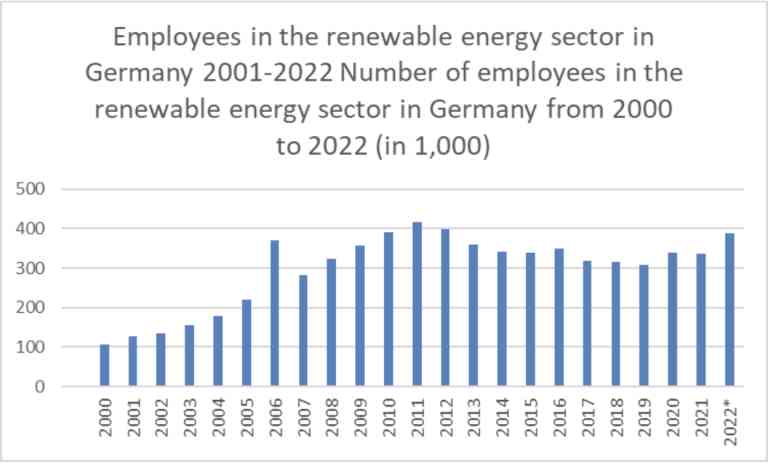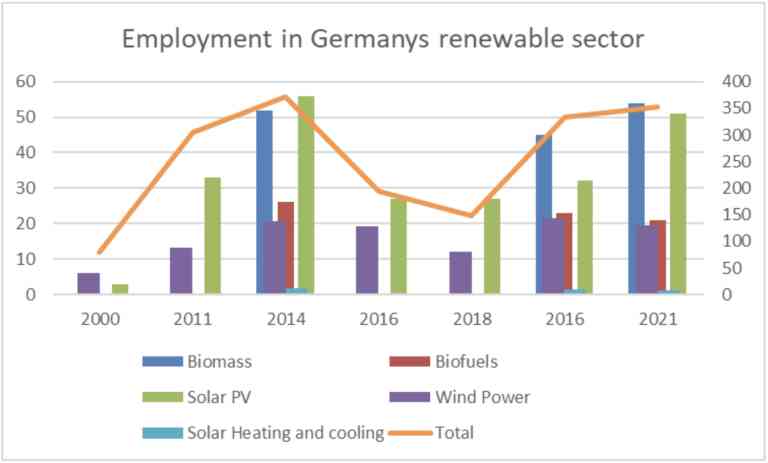Title: Unlocking the Labour Market Consequences of the Energy Transition
Author: Mutiara Chandragati Ramadhan
There is an ongoing trend in energy transition from conventional energy sources of energy such as fossil fuels to renewable energy sources globally in the 2000s. More global efforts and policies have been continuously developed since the 2000s. These include the efforts to advance the technologies of wind turbine designs as well as strengthening the impact of policies like the Paris Agreement that have set the international agenda for reducing carbon emissions. The transformation of the energy systems has been influenced by the technology advancements in energy systems, a shift from the agriculture economy to industry economy such as the United State, and the recent emerging issues touching on global warming and climate change.
The energy transition that has been unfolding over the past two decades is preceded in three stages. The first significant stage was marked by the transition from traditional biomass to coal during the Industrial Revolution in the late 18th to the 19th century. The transition to oil and gas was the second major transition emerging in the 20th century due to the development of the internal combustion engine and the expansion of electricity use. The current stage of energy transition occurs as the world has been shifting from fossil fuel energy sources towards renewable energy sources like solar and wind (World Economic Forum, 2022). This transition to renewable energy is occurring globally with the common goal of achieving net-zero emissions by 2050.
One of the leading nations that has taken a progressive step towards this energy transition is Germany. Germany's Energiewende, initiated in the early 1990s, is their national strategy that not only represents this global trend but also offers a model for other nations to follow. The Energiewende aimed to withdraw gradually from nuclear power and increase the share of renewables in its energy mix (Federal Ministry for Economic Affairs and Climate Action, 2015). Germany has also been very strategic and had ambitious targets for the use of renewable energy sources while at the same time promoting innovation and sustainable infrastructure (Federal Ministry for Economic Affairs and Climate Action, 2015).
The impact of this shift in energy sources on employment in Germany and the challenges faced by workers during this transition can serve as an example to further understand the consequences of transitioning to a renewable energy-focused economy. According to the IEA report 2023, global investments in renewable energy have exceeded those in fossil fuels since 2019. It is important to examine how this transition may have impacted job opportunities, job displacement, and the need to help the displaced workers. This shift to renewable energy is not solely about technology or the environment but is at the same time a concern of employment and social security.
Employment Growth Trend in the Renewable Energy Sector
Renewable energy in Germany has been recorded to have increased their employment rate and job creation for the last twenty years (see Figure 1).

Most of the expansion in this sector has been particularly witnessed in wind and solar photovoltaic energy. Clean Energy Wire 2018 reports that the wind energy sector had its highest recorded employment, in 2016 at about 160000 employees (see Figure 2).

However, the solar PV industry experienced a significant decrease after the German government reduced the financial incentives for renewable energy technologies. This abrupt policy change had caused a rush of installations before the new tariffs took effect, leading to a temporary boom followed by a sharp decline in demand for solar PV systems. The sharp decline, therefore, has led to a significant reduction in jobs within the solar energy sector.
Solar PV panel production and installation jobs fell from 150,000 in 2011 to just over 28,000 in 2018 (Clean Energy Wire, 2021). Similarly, the wind industry declined from about 108,000 in 2016 to less than 70,000 in 2018. These fluctuations had exposed Germany's renewable energy sector to more risks, especially from international markets and domestic policy changes. These risks may have included uncertainties in the supply chain, such as price fluctuations and trade policies because the fluctuation in employment may have caused a disruption and uncertainty in the supply chain.
The employment rates in the energy sector started increasing again only from 2019 onwards. In 2022, 386,700 workers were in the renewable energy sector which was an increase by 15% from the previous year and the highest in a decade (Renewable Wire Energy, 2024). The growth in Germany's renewable energy sector can be seen as a sign of recovery and adaptation to the global economy, as well as a testament to the ongoing creation of jobs in this field as the country continues to transition towards a power supply dominated by renewable sources. Looking at these various employment patterns along the policy changes that have been done, it is possible to identify several factors that affect the development of jobs in the renewable energy sector beyond policy shifts and global competition.
Job Displacements and Adjustments
The German labour market has had to adapt to the changes in renewable technologies. As the efficiency and cost-effectiveness of renewable energy keep rapidly improving, the demand for people with higher skills in these industries has also increased. The demand has grown not only for positions that are directly involved in the creation and installation of renewable energy technologies but also for those involved in research and development upkeep and the enhancement of the essential infrastructure to facilitate the increasing presence of renewables in the energy blend.
his experience from Germany's energy transition can set a benchmark for Indonesia to follow in its own energy transition efforts. How should we, as a country and as an economy prepare for reskilling and upskilling the existing workforce to adapt to the changes? Workers from traditional energy sectors such as coal and oil and gas have often faced challenges to adjust to the new trends in the energy industry such as increased competition from renewable energy sources, stricter environmental regulations, and the elimination of coal power plants.
For instance, the European Court of Auditors' data mentions that employment in the coal-mining in the Lausitz region of Brandenburg and Saxony has decreased from 80,000 during the key period of decline from 1990 to 2000, to 6202 employees in 2018 (European Union, 2022).
In addition, employees who previously worked in the traditional energy sector often face difficulties in obtaining satisfying jobs in the renewable energy sector since the specializations needed are different. For example, coal miners may not possess the technical skills needed to secure jobs in renewable energy fields such as solar and wind energy production. Moreover, the older workers in these sectors may need help to retain or learn new skills due to age-related barriers or financial constraints.
German Government Policy Incentives
The German government and industry stakeholders have put in a range of policies and measures aimed to assist workers and regions affected by the shift away from traditional energy sources. Training and education programs are one of the major approaches that have been taken. This is designed to provide knowledge to the workers from traditional energy sectors with skills needed to open up opportunities for them in the renewable energy sector.
One of the programs implemented in Germany is Vocational Education and Training (VET). It is a training program aimed at helping countries to develop skills and in the process also helping the younger generation to meet the requirements of the future labour market (OECD, 2010). There is also the Coal Compromise Program, which plans to gradually eliminate coal-fired power plants by 2038 while ensuring economic stability and job security for the affected regions and workers who still depend on the coal industry (EESC, 2023).
The plan includes financial assistance to help transform coal-dependent regions. The funds are allocated to infrastructure development, research and innovation projects, and the promotion of emerging new industries (Federal Ministry for Economic Affairs and Energy, 2015). These services are relevant for the workers who seek to change their occupation from industries that are declining to the industries that are emerging such as the renewable energy transition sector.
Conclusion
Germany's Energiewende movement has brought the green revolution in the labour market of Germany presenting both challenges and opportunities. From the conventional energy sources to renewable energy sources, the transformation can be seen in the development of wind and solar PV industries and thereby providing employment for the citizens. However, this change has also resulted in job losses, particularly in the coal and nuclear sectors.
This implies that support measures should be taken by policy makers. In Germany, the government and industry stakeholders have taken measures through training and educational programs such as "Coal Comprise." Through other measures such as funding for workers education and training, and economic incentive programs, Germany may overcome some of the challenges that will come with transitioning to sustainable energy sources. These approaches are important to ensure the transition to renewable energy that is inclusive and sustainable.
Bibliography
BMWK - Bundesministerium fr Wirtschaft und Klimaschutz. (n.d.). Bruttobeschftigung durch Erneuerbare Energien 2000 bis 2022. BMWK. https://www.bmwk.de/Redaktion/DE/Downloads/E/ee-beschaeftigte-2000-2022.html
Bundesagentur fr Arbeit. (n.d.). Services. Retrieved from https://www.arbeitsagentur.de/en
Federal Ministry for Economic Affairs and Energy. (2015). The Energy of the Future: Fourth "Energy Transition" Monitoring Report --- Summary. Retrieved from https://www.bmwk-energiewende.de/EWD/Redaktion/EN/Newsletter/2015/01/Meldung/topthema-the-energy-transition.html
Clean Energy Wire. (2021). Correction: Drop in production and installation cuts employment in German renewables sector. https://www.cleanenergywire.org/news/correction-drop-production-and-installation-cuts-employment-german-renewables-sector
Clean Energy Wire. (2021). German renewables sector employment 2022 highest level in a decade. https://www.cleanenergywire.org/news/german-renewables-sector-employment-2022-highest-level-decade
European Union. (2022). Special report: EU support to coal regions in transition. https://op.europa.eu/webpub/eca/special-reports/support-coal-regions-22-2022/en/
European Economic and Social Committee. (2014). Opinion on tackling the skills mismatch through upskilling and reskilling of the workforce. https://www.eesc.europa.eu/sites/default/files/files/qe-05-23-214-en-n.pdf
Federal Ministry for Economic Affairs and Energy. (2015). The Energy Transition: Switch to the future. https://www.bmwk-energiewende.de/EWD/Redaktion/EN/Newsletter/2015/01/Meldung/topthema-the-energy-transition.html
Federal Ministry of Education and Research. (2008). The Qualification Initiative for Germany. https://www.bmbf.de/en/index.html
International Energy Agency. (2023). World Energy Investment 2023. Retrieved from https://www.iea.org/reports/world-energy-investment-2023/overview-and-key-findings
International Renewable Energy Agency (IRENA). (2021). Renewable power generation costs in 2021. https://www.irena.org/publications/2022/Jul/Renewable-Power-Generation-Costs-in-2021
International Renewable Energy Agency (IRENA). (2023). Renewable power generation costs in 2023. https://www.irena.org/publications/2022/Jul/Renewable-Power-Generation-Costs-in-2021
International Renewable Energy Agency (IRENA). (2013). Renewable power generation costs in 2013. https://www.irena.org/publications/2022/Jul/Renewable-Power-Generation-Costs-in-2021
National Renewable Energy Laboratory. (2023). Wind Technology, Cost, and Performance Trends. https://www.nrel.gov/docs/fy23osti/81246.pdf
Springer. (2023). Sustainable Science. https://link.springer.com/article/10.1007/s11625-023-01440-y
ScienceDirect. (2007). Energy Policy. https://www.sciencedirect.com/science/article/pii/S0301421507003850
Statista. (n.d.). Number of employees in the renewable energy sector in Germany from 2000 to 2022. https://www.statista.com/statistics/583431/renewable-energy-sector-employees-germany/
OECD. (2014). Skills beyond school: Synthesis report. OECD Publishing. https://www.oecd.org/education/skills-beyond-school/45938559.pdf
World Economic Forum. (2022, April). Visualizing the history of energy transitions. https://www.weforum.org/agenda/2022/04/visualizing-the-history-of-energy-transitions/
Follow Instagram @kompasianacom juga Tiktok @kompasiana biar nggak ketinggalan event seru komunitas dan tips dapat cuan dari Kompasiana. Baca juga cerita inspiratif langsung dari smartphone kamu dengan bergabung di WhatsApp Channel Kompasiana di SINI









